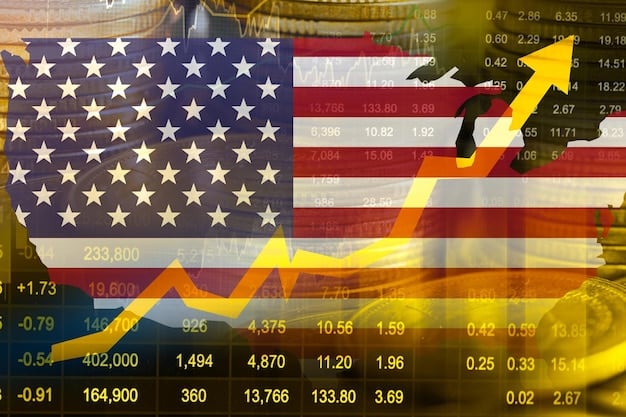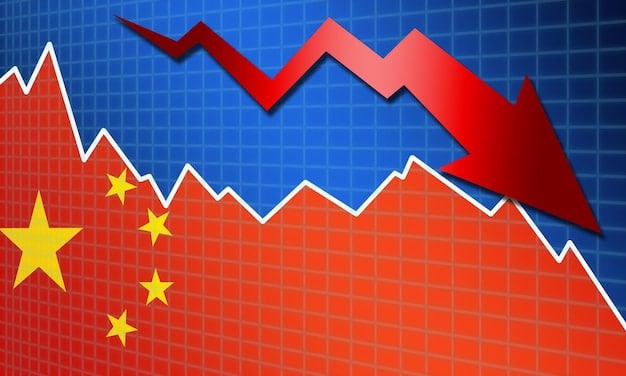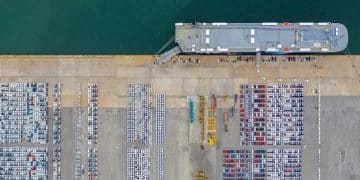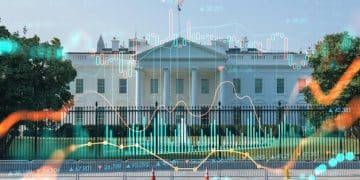Global Economic Events: Analyzing the Impact on the US Market

A comprehensive analysis reveals how global economic events significantly impact the US market, affecting trade, investment, and overall economic stability.
The US market, while robust, is deeply intertwined with the global economy. Understanding the impact of global economic events on the US market: a comprehensive analysis, is crucial for investors, policymakers, and anyone interested in the financial health of the nation. Let’s explore how these events shape the American economic landscape.
Understanding Global Economic Interdependence
In an increasingly interconnected world, the US economy is no longer an isolated entity. Global economic interdependence means that events occurring in seemingly distant corners of the globe can have profound ripple effects on the American market. Understanding this interconnectedness is the first step in analyzing the impact of these events.
This interdependence manifests in various forms, including trade relationships, investment flows, and financial market linkages. Let’s examine some of the key channels through which global events influence the US economy.
Trade Relationships and Supply Chains
The US is a major player in international trade, with significant trade relationships with countries around the world. Disruptions to global trade, whether caused by geopolitical tensions, natural disasters, or economic downturns in key trading partners, can have a direct impact on US businesses and consumers.
Global supply chains, which have become increasingly complex and interconnected over the past few decades, are particularly vulnerable to disruptions. A single disruption in a critical link of the supply chain can lead to widespread shortages, price increases, and production delays in the US.
Investment Flows and Financial Markets
The US financial markets are also deeply integrated with the global financial system. Capital flows in and out of the US can be significantly affected by global economic events, influencing interest rates, exchange rates, and asset prices.
For instance, a crisis in a foreign country can lead to a “flight to safety,” with investors pulling their money out of risky assets and investing in the perceived safety of US Treasury bonds, driving down interest rates. Alternatively, strong economic growth in emerging markets can attract investment away from the US, potentially weakening the dollar.

In conclusion, the US economy is inextricably linked to the global economy. Understanding these linkages is crucial for navigating the complexities of the modern economic landscape.
Geopolitical Events and Their Economic Fallout
Geopolitical events, ranging from wars and political instability to trade disputes and international sanctions, can have significant economic consequences for the US. These events can disrupt trade, create uncertainty, and lead to increased volatility in financial markets.
The economic fallout from geopolitical events can manifest in various ways, impacting different sectors of the US economy.
- Increased Uncertainty: Geopolitical events often create uncertainty, which can lead to businesses postponing investment decisions and consumers reducing spending.
- Trade Disruptions: Wars, trade disputes, and sanctions can disrupt trade flows, leading to shortages and price increases.
- Financial Market Volatility: Geopolitical events can trigger volatility in financial markets, leading to losses for investors.
Examples of geopolitical events that have had a significant impact on the US economy include the oil shocks of the 1970s, the Asian financial crisis of the late 1990s, and the recent trade war between the US and China. These events highlight the vulnerability of the US economy to global political and economic instability.
Analyzing these events helps understand potential risks to the US markets, preparing investors and policymakers for possible future impact.
The Impact of Economic Downturns in Major Economies
When major economies like China, Europe, or Japan experience economic downturns, the US market is often affected. These slowdowns can reduce demand for US exports, disrupt global supply chains, and create financial instability.
Economic downturns in major economies can have a cascading effect on the US economy.
Reduced Demand for US Exports
When foreign economies slow down, they tend to import less from the US. This reduced demand for US exports can hurt US businesses, particularly those that rely heavily on exports to these countries.
Disruptions to Global Supply Chains
Economic downturns can also disrupt global supply chains, leading to shortages and price increases for US businesses and consumers. For example, if a key supplier in China is forced to shut down due to a recession, it can disrupt production in the US.
Financial Instability
Economic downturns in major economies can also create financial instability, leading to volatility in financial markets and potentially triggering a recession in the US.
For example, the European debt crisis of the early 2010s had a significant impact on the US economy, leading to increased volatility in financial markets and slowing down economic growth.
In sum, the connections of the US economy make it susceptible to economic changes across the globe, highlighting the critical need for awareness and readiness for such possible events.

The Role of International Organizations
International organizations such as the International Monetary Fund (IMF) and the World Bank play a significant role in shaping the global economic landscape and influencing the US market. These organizations provide financial assistance, policy advice, and technical assistance to countries around the world, helping to promote economic stability and growth.
The actions and policies of these organizations can have a direct impact on the US economy.
- Financial Assistance: The IMF provides financial assistance to countries facing balance of payments problems, helping to prevent financial crises and promote economic stability.
- Policy Advice: The IMF and the World Bank provide policy advice to member countries on a wide range of economic issues, including fiscal policy, monetary policy, and structural reforms.
- Technical Assistance: These organizations also provide technical assistance to member countries, helping them to improve their economic management and governance.
For example, the IMF played a key role in helping to stabilize the global economy during the 2008 financial crisis. The organization provided financial assistance to several countries facing severe economic difficulties, helping to prevent a global depression.
Being aware of these organizations helps those involved in the US market understand the broader economic picture and how they contribute to stability.
Currency Fluctuations and Their Effects
Currency fluctuations, particularly the exchange rate between the US dollar and other major currencies, can have a significant impact on the US economy. A strong dollar can make US exports more expensive and imports cheaper, while a weak dollar can have the opposite effect.
Currency fluctuations affect several aspects of the US economy.
Impact on Trade
A strong dollar can hurt US exporters, as their products become more expensive for foreign buyers. This can lead to reduced exports and a wider trade deficit. Conversely, a weak dollar can boost US exports, as their products become cheaper for foreign buyers.
Impact on Inflation
A weak dollar can also lead to higher inflation in the US, as imports become more expensive. This can erode consumer purchasing power and lead to higher interest rates.
Impact on Investment
Currency fluctuations can also affect investment decisions. A strong dollar can attract foreign investment into the US, while a weak dollar can discourage foreign investment.
Central banks such as the Federal Reserve actively monitor currency fluctuations and implement policies to mitigate their impact on the US economy.
The impact that currency fluctuations have on inflation, trade, and investment emphasize the importance of keeping a close watch on them.
Technological Advancements and Global Competition
Technological advancements and increasing global competition are reshaping the US market, creating both opportunities and challenges for American businesses and workers. Technological innovation can boost productivity and create new industries, but it can also lead to job displacement and increased wage inequality.
Several factors influence these dynamic changes.
Increased Productivity
Technological advancements can lead to increased productivity, allowing businesses to produce more goods and services with fewer resources. This can lead to lower prices, higher profits, and increased economic growth.
Job Displacement
However, technological advancements can also lead to job displacement, as machines and automation replace human labor. This can create challenges for workers who lack the skills and training needed to adapt to the changing labor market.
Global Competition
Increasing global competition is also putting pressure on US businesses to innovate and become more efficient. Companies that fail to adapt to the changing global landscape risk losing market share to foreign competitors.
Governments and business leaders need to promote policies that help US workers and businesses adapt to these changes through education, training, and infrastructure improvements.
The importance of staying adaptable to technological advancements and international competition ensures that the US economy continues to grow in a global landscape.
| Key Point | Brief Description |
|---|---|
| 🌍 Global Interdependence | US economy heavily relies on global trade and finance. |
| ⚔️ Geopolitical Impacts | Events like wars and sanctions can disrupt trade and increase market volatility. |
| 📉 Economic Downturns | Slowdowns in major economies affect US exports and financial stability. |
| 💰 Currency Fluctuations | Dollar strength/weakness greatly impacts trade and inflation. |
Frequently Asked Questions
▼
Trade wars increase tariffs, leading to higher prices for consumers and businesses. Reduced trade can slow economic growth and increase uncertainty for investors.
▼
The Federal Reserve monitors global economic conditions and adjusts monetary policy to promote stability and growth in the US. It also collaborates with other central banks.
▼
Emerging markets are key drivers of global growth and demand for US exports. Their economic health affects US businesses, investors, and overall economic stability.
▼
Risks include trade disruptions, financial instability, geopolitical tensions, and economic downturns in major economies. These can affect growth and employment in the US.
▼
Diversifying investments, monitoring global events, staying informed about economic trends, and having risk management strategies in place are crucial steps for stability.
Conclusion
In conclusion, the US market is profoundly impacted by global economic events, underscoring the necessity for businesses, policymakers, and investors to remain vigilant and adaptable. By understanding the dynamics of global interdependence, observing key economic patterns, and preparing for prospective risks, stakeholders can effectively navigate the intricacies of the international economic landscape and secure the future prosperity of the US economy.





